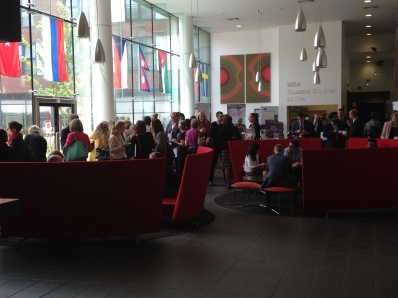CSR and the subsequent level of social impact created, is fast becoming a ‘must do’ subject within boardrooms across the globe, which is making business leaders (who are used to the traditional focus of pure wealth creation) a little uncomfortable.
As CSR becomes an increasingly important driver for strategic and commercial growth for forward-thinking and socially-aware businesses, it means that CEOs are also having to change their own personal perception and mindset, towards what once was regarded as a ‘nice thing to do’.
Businesses are ultimately set up to make a profit (what they do with that profit, is their own choice) but the context of profit in a more socially-conscious world is expanding rapidly.
When I founded the Annual Birmingham CSR Summit in 2011, the whole premise of my idea was to encourage more strategic conversations about what CSR truly means to the modern day business and to broker more cross sector relationships, based on the sharing of best practices.
I decide to partner with the CSR Network Thrive and in 2012, we launched the 1st Annual CSR Summit asking one simple question “Do businesses truly see CSR as something critical?” – June 2015 will be CSR Summit number 4 and we will continue to focus on the win/win result of opening up strategic growth opportunities for businesses, whilst creating a more strategic and long-term approach to CSR.
I firmly believe that this ethos increases the chance of long term impact in society, not just a one off activity that makes people feel good for the day!
In our business, we help key decision-makers within the business to unlock the entrepreneurial potential of their staff, aligning personal values, wants and needs with that of the business, and combine that with a more strategic and embedded approach to CSR.
We come across many reasons why companies find it difficult to view and embed CSR as a strategic driver for growth, and prefer to view it as an expense and a ‘nice thing to do.
Here are my top 5 factors that would enable decision-makers to implement a more strategic view of CSR, that creates both long-term commercial AND social impact in society:
- Create a collaborative company vision – Leaders need to set the ‘corporate frame of CSR’ but give all stakeholders (including staff, customers and suppliers) more opportunity to ‘paint the picture’ of what this means for the company. Encouraging their personal and social inputs into a corporate vision, would help to increase motivation and productivity, as they would ‘own’ the future of the company’s CSR agenda.
- Embrace the fear of what the future may look like – Fear is a psychological state of mind that inhibits action. For the CEO / Executive Team that wishes to become more strategic with CSR, it can affect the culture of the business. It is important for CEO’s to work with others to create strategies that could be implemented if the specific ‘fear’ came true – that way, if it happens, you know what to do and therefore there is nothing to fear!
- Watch the accepted language of the company – Positivity is key in any business. So often, the context of what is being said is open to interpretation, so it is important that the desire to change and what it means for the company and staff, is clear, communicated effectively and that the feedback channel you employ, gives you confidence that it was received well.
- See change as evolution, not revolution – Change is the only thing in life that is constant, and this is no different in business. But strategic CSR includes a transparent and inclusive integration of personal change, to achieve corporate change. It is essential that leaders promote a collective approach to change, detailing why change is important but how this will affect each and every person.
- Decide to learn the lessons that you don’t want to be taught – Executive teams are used to ‘how things have always been done’ and it is an imbalance for them to have to learn new ways to achieve the results they are used to. The transition can highlight their own inadequacies that they had learned how to hide, or indeed, open up new opportunities that are not feeling confident enough to take advantage of. But tough lessons, breed maturity and the power in learning from them is priceless, so adapting to the aftermath of learning, is crucial for survival.
The world of CSR and Social Impact, has changed.
I simply hope that some CEO’s make the decision to change too – that way, society will truly prosper because businesses will finally regard CSR as an long-term investment, not a short-term expense.
Till the next time,
JB
Joel Blake is an award-winning CSR Strategy Advisor, Motivational Speaker and Entrepreneur. He is the Founder and Chief Executive of Cultiv8 Solutions, a leading CSR Advisory firm for the professional services sector. He has over 15 years of experience in CSR Strategy Development, Diversity and Entrepreneurship. You can learn more about Joel Blake by visiting www.linkedin.com/in/joelgrahamblake



